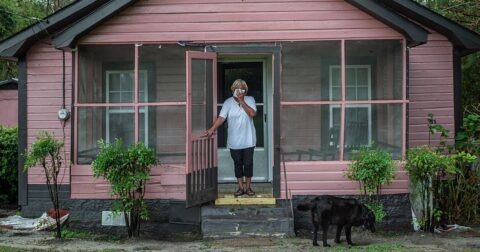News
A Major Agreement to Protect the Amazon Is Falling Apart After 20 Years
Climate•6 min read
News
Fighting industrial meat and dairy conglomerates requires cooperation and a belief in the possibility of food justice.

News • Legal Action • Policy

Words by Grace Hussain
South Dakota’s Republican Governor, Kristi Noem, stood in front of a bright green John Deere tractor in March as she signed a bill into law limiting the rights of individuals to sue CAFOs and other farms. The move was just the latest in her crusade to attract more large-scale farms to her state.
According to Eowyn Corral, a campaigner for Dakota Rural Action, the governor’s efforts come at the expense of local communities and the environment. The nonprofit, which advocates for a more resilient, local food system, has deep roots in South Dakota dating back to the 1980’s.
The challenge: as a “tiny grassroots organization” their resources and people power are limited, says Corral. The group often turns to partners to help devise legal strategies and leverage connections. Now, organizations like Dakota Rural Action have a new ally, a hub focused on uniting lawyers across the country toward the goal of protecting people from factory farms.
According to their press release, Farmstand is the first legal nonprofit fighting on behalf of “communities impacted by corporate agriculture.” The goal of the new legal advocacy nonprofit is to create a fair food system, says Executive Director Jessica Culpepper, one that “disrupts [industrial agriculture’s] business model of exploitation and extraction.”
While animal welfare advocates have pulled out some pretty big legal and policy wins, the communities and people who have to deal with the fallout from factory farms aren’t always represented at the highest levels of government. As Corral points out, there’s a lot of “money consolidated in keeping the food system status quo,” which is why it’s so crucial that smaller advocacy groups band together.
When members of a community band together to sue a factory farm, they’re often up against an entire corporate monopoly. For example, just four companies — JBS, Tyson, Cargill and National Beef Packing Company — are responsible for processing virtually all beef consumed in the U.S. The story stays the same across other meat and dairy industries too: everything from the genetics of broiler chickens to milk production is controlled by just a small handful of corporations. Together, these companies have a lock on an industry replete with labor abuses, environmental destruction and racism.
The team at Farmstand has previously helped community organizations in the Yakima Valley of Washington hold water polluting dairies accountable, making them clean up not just their act but the water they damaged. In another motion, they successfully compelled the fulfillment of public records requests demonstrating just how much funding factory farms are getting from the federal Farm Service Agency.
What’s unique about Farmstand is the group has incorporated the problem of corporate consolidation into its strategy. Uniting against industrial meat has helped the group attract a diverse array of stakeholders including grassroots groups working for labor, environmental and animal rights. According to Culpepper, “that’s the kind of power we need to build” in order to reform the food system.
A big part of being a Farmstand attorney is “being present and being trusted” with grassroots activists and locals, says Culpepper. That’s why many of their litigators can be found on the ground in communities listening to their experiences and learning about the challenges they’re up against, challenges that could become grounds for legal action.
Ultimately, no one group is capable of realizing the change Farmstand is working toward, which is why the group is investing so heavily in coalition building. The organization aims to provide a space “for those who believe that justice is possible,” says Culpepper. Removing injustice for just one part of the food system is not a solution, she adds, it’s just the solution that comes when people think the status quo is “inevitable.”
This piece has been updated to correct “coalition” as Farmstand is a non-profit that works with other coalitions.